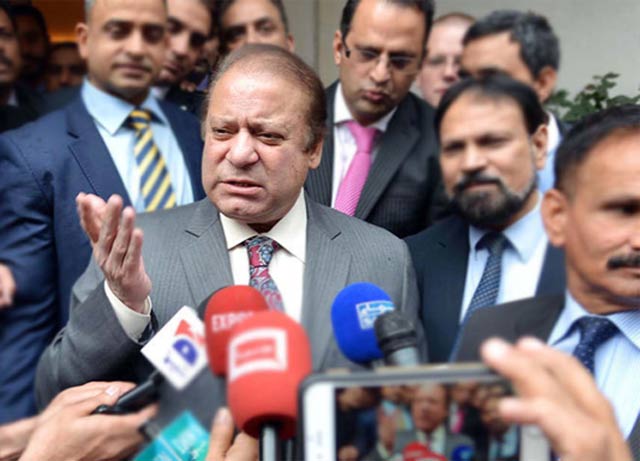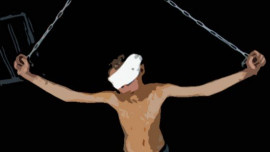
In the documents submitted before the Supreme Court in the Panamagate case, the Sharif family has attached two different deeds where Maryam Safdar is a trustee of her brother’s companies.
London flats were bought through Qatari investments, Sharif family tells SC
On February 2, 2006, Premier Sharif’s daughter signed a declaration with her brother Hussain Nawaz as a trustee in his two companies Nescol and Nielsen. The same day, she signed a similar declaration with him for another company, Coomber Group, in which he owns 49% shares.
This third company is likely to be the focus of Pakistan Tehreek-e-Insaf’s legal team in the next hearing scheduled for December 6.
After a two-week hiatus when a five-member bench of the apex court resumed hearing on Wednesday, the PTI legal team raised more than 10 questions to establish their case.
Agreeing to some of the arguments put forward by PTI’s lead counsel Naeem Bukhari, some judges observed that the Sharif family was ‘hiding’ facts about the ownership of the offshore companies as some necessary documents still seem to be missing in their replies.
The judges also raised questions on the money trail the Sharif family has so far submitted before the court and pointed out missing links. The missing details included banking transactions or any other channels through which money had been transferred from Dubai to Qatar and then to London to acquire the expensive property in an upscale neighbourhood of London.
One of the judges also pointed out that there were two contradictory descriptions on the part of the Sharif family. One was narrated by the prime minister on the floor of parliament, claiming his family had set up a factory in Jeddah in 1999 using money from the Gulf Steel Mills it had established in Dubai, and later the Saudi factory had been sold to buy London properties.
Panama leaks case: PTI submits ‘evidence’ against Sharif family
Justice Ijaz ul Ahsan, agreeing with Bukhari’s contention, said that the other narrative came from the written replies the Sharif family has submitted before the court in which the Jeddah factory has no mention and the money trail has been directly established from selling the UAE factory to investments with the Qatari royal family.
An affidavit submitted on behalf of a Qatari prince claims that the London flats had been given in the ownership of Hussain Nawaz in 2006 as part of a business deal against investments made by his late grandfather with his family in the real estate business in the early 1980s.
To substantiate this account, the Sharif family had submitted another affidavit from Tariq Shafi, a cousin of Premier Nawaz who actually owned the business in Dubai in the 1970s. According to him, he was working on behalf of his uncle, the late father of Premier Nawaz. All shares in those businesses in Dubai were sold in 1980, generating 12 million UAE dirhams. The bench observed that Shafi’s signature on the affidavit did not match with the signature in the agreement.
Bukhari contended that despite having liability of 14 million dirhams to Bank of Credit & Commerce International Dubai (BCCI), the Sharif family had invested 12 million dirhams in Qatar in 1980. He went on to state that there was not a single document produced by the Sharif family to establish how the money had been sent from Pakistan to Dubai, Qatar, Jeddah and London.
Justice Asif Khosa observed that there was no banking trail of transfer of money from Dubai to London. He, however, asked the PTI counsel to establish that the Sharif family was the owner of these flats prior to 2006.
Nawaz family used offshore firms to own UK properties
“If you establish a connection with this property prior to 2006, then the burden of proof will be shifted to other side. Show us the connection as this is your entire case,” Justice Khosa observed. However, he said Premier Nawaz in his speeches talked about the trail of the money as he may forget.
Justice Azmat Saeed Sheikh, who has expertise in white-collar crimes, raised several questions over the money trail of the Sharif family’s London flats. No explanation has been given about how the family had cleared liability to the BCCI. He also observed that there was no explanation from the Sharif family that how had they gotten the money to set up Jeddah Steel Mills.
He was also surprised how the respondents had hidden the name of the owner of the Minerva Officer Limited, which was a share-holder of Nielsen and Nescol in 1994.
“No supportive document has been submitted to establish the ownership of Minerva. Why this information is being hidden from the bench,” Justice Azmat remarked. The judge also observed that the bench was conducting the inquisitorial proceedings in this matter.
Earlier, Bukhari pointed out that Premier Sharif has made contradictory statements regarding the ownership of the London flats. He also stated that the prime minister has evaded tax, adding that Marriam was a dependent and remain a dependent. The Qatari prince’s letter has totally negated the prime minister’s earlier stance.
The case was adjourned until next Tuesday.
Published in The Express Tribune, December 1st, 2016.

















COMMENTS (6)
Comments are moderated and generally will be posted if they are on-topic and not abusive.
For more information, please see our Comments FAQ